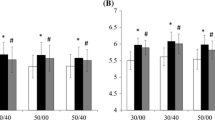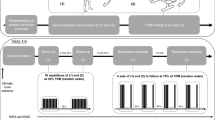Abstract
Purpose
To determine the acute cardiovascular and perceptual responses of low-load exercise with or without blood flow restriction and compare those responses to that of moderately heavy exercise.
Methods
Twenty-two participants completed unilateral elbow flexion exercise with a moderately heavy-load- [70% one-repetition maximum (1RM); 70/0] and with three low-load conditions (15% 1RM) in combination with 0% (15/0), 40%, (15/40) and 80% (15/80) arterial occlusion pressure. Participants exercised until failure (or until 90 repetitions per set). The cardiovascular response (arterial occlusion) was measured pre and post exercise and the perceptual responses [ratings of perceived exertion (RPE) and discomfort] were determined before and after each set of exercise.
Results
For arterial occlusion pressure, the lower-load conditions had greater change from pre to post compared to 70/00 (e.g., 15/80: 44 vs. 70/0: 34 mmHg). RPE was highest across the sets for the 15/80 condition with the other conditions having similar RPE (e.g., set 4: median rating of 17.2 for 15/80 vs. ~ 15.5 for other conditions). Ratings of discomfort were also greatest for the 15/80 condition (15/80 > 15/40 > 15/0 > 70/0). Exercise volume within the 15/0 and 15/40 conditions were similar but were significantly greater than that observed with the 15/80 and 70/0 conditions.
Conclusion
Low-load exercise to volitional failure results in a greater cardiovascular response to that of moderately heavy-load exercise. When high pressure is applied to low load exercise, there is a reduction in exercise volume but an elevated perceptual response that may be an important consideration when applying this stimulus in practice.


Similar content being viewed by others
Abbreviations
- 1RM:
-
One-repetition maximum
- 15/0:
-
15% one-repetition maximum/0% arterial occlusion pressure
- 15/40:
-
15% one-repetition maximum/40% arterial occlusion pressure
- 15/80:
-
15% one-repetition maximum/80% arterial occlusion pressure
- 70/0:
-
70% one-repetition maximum/0% arterial occlusion pressure
- ANOVA:
-
Analysis of variance
- RPE:
-
Ratings of perceived exertion
References
Abe T, Kearns CF, Sato Y (2006) Muscle size and strength are increased following walk training with restricted venous blood flow from the leg muscle, Kaatsu-walk training. J Appl Physiol Bethesda Md 1985 100:1460–1466. https://doi.org/10.1152/japplphysiol.01267.2005
Barnett BE, Dankel SJ, Counts BR et al (2016) Blood flow occlusion pressure at rest and immediately after a bout of low load exercise. Clin Physiol Funct Imaging 36:436–440. https://doi.org/10.1111/cpf.12246
Brandner CR, Kidgell DJ, Warmington SA (2015) Unilateral bicep curl hemodynamics: low-pressure continuous vs high-pressure intermittent blood flow restriction. Scand J Med Sci Sports 25:770–777. https://doi.org/10.1111/sms.12297
Burd NA, Andrews RJ, West DW et al (2012) Muscle time under tension during resistance exercise stimulates differential muscle protein sub-fractional synthetic responses in men. J Physiol 590:351–362. https://doi.org/10.1113/jphysiol.2011.221200
Counts BR, Dankel SJ, Barnett BE et al (2016) Influence of relative blood flow restriction pressure on muscle activation and muscle adaptation. Muscle Nerve 53:438–445. https://doi.org/10.1002/mus.24756
Dankel SJ, Jessee MB, Mattocks KT et al (2017) Training to fatigue: the answer for standardization when assessing muscle hypertrophy? Sports Med Auckl NZ 47:1021–1027. https://doi.org/10.1007/s40279-016-0633-7
Ellefsen S, Hammarström D, Strand TA et al (2015) Blood flow-restricted strength training displays high functional and biological efficacy in women: a within-subject comparison with high-load strength training. Am J Physiol Regul Integr Comp Physiol 309:R767–R779. https://doi.org/10.1152/ajpregu.00497.2014
Fahs CA, Loenneke JP, Thiebaud RS et al (2015) Muscular adaptations to fatiguing exercise with and without blood flow restriction. Clin Physiol Funct Imaging 35:167–176. https://doi.org/10.1111/cpf.12141
Hollander DB, Reeves GV, Clavier JD et al (2010) Partial occlusion during resistance exercise alters effort sense and pain. J Strength Cond Res 24:235–243. https://doi.org/10.1519/JSC.0b013e3181c7badf
Holm L, Reitelseder S, Pedersen TG et al (2008) Changes in muscle size and MHC composition in response to resistance exercise with heavy and light loading intensity. J Appl Physiol Bethesda Md 1985 105:1454–1461. https://doi.org/10.1152/japplphysiol.90538.2008
Jessee MB, Dankel SJ, Buckner SL et al (2017) The cardiovascular and perceptual response to very low load blood flow restricted exercise. Int J Sports Med 38:597–603. https://doi.org/10.1055/s-0043-109555
Kubota A, Sakuraba K, Koh S et al (2011) Blood flow restriction by low compressive force prevents disuse muscular weakness. J Sci Med Sport 14:95–99. https://doi.org/10.1016/j.jsams.2010.08.007
Lixandrão ME, Ugrinowitsch C, Laurentino G et al (2015) Effects of exercise intensity and occlusion pressure after 12 weeks of resistance training with blood-flow restriction. Eur J Appl Physiol 115:2471–2480. https://doi.org/10.1007/s00421-015-3253-2
Loenneke JP, Balapur A, Thrower AD et al (2011) The perceptual responses to occluded exercise. Int J Sports Med 32:181–184. https://doi.org/10.1055/s-0030-1268472
Loenneke JP, Kim D, Mouser JG et al (2016) Are there perceptual differences to varying levels of blood flow restriction? Physiol Behav 157:277–280. https://doi.org/10.1016/j.physbeh.2016.02.022
Mattocks KT, Jessee MB, Counts BR et al (2017) The effects of upper body exercise across different levels of blood flow restriction on arterial occlusion pressure and perceptual responses. Physiol Behav 171:181–186. https://doi.org/10.1016/j.physbeh.2017.01.015
Morton RW, Oikawa SY, Wavell CG et al (2016) Neither load nor systemic hormones determine resistance training-mediated hypertrophy or strength gains in resistance-trained young men. J Appl Physiol 121:129–138. https://doi.org/10.1152/japplphysiol.00154.2016
Motykie GD, Zebala LP, Caprini JA, Lee CE, Arcelus JI, Reyna JJ, Cohen EB (2000) A guide to venous thromboembolism risk factor assessment. J Thromb Thrombolysis 9(3):253–262
Mouser JG, Laurentino GC, Dankel SJ et al (2017) Blood flow in humans following low-load exercise with and without blood flow restriction. Appl Physiol Nutr Metab Physiol Appl Nutr Metab 42:1165–1171. https://doi.org/10.1139/apnm-2017-0102
Ogasawara R, Thiebaud RS, Loenneke JP et al (2012) Time course for arm and chest muscle thickness changes following bench press training. Interv Med Appl Sci 4:217–220. https://doi.org/10.1556/IMAS.4.2012.4.7
Spranger MD, Krishnan AC, Levy PD et al (2015) Blood flow restriction training and the exercise pressor reflex: a call for concern. Am J Physiol Heart Circ Physiol 309:H1440–H1452. https://doi.org/10.1152/ajpheart.00208.2015
Steel J, Fisher J, McKinnon S et al (2017) Differentiation between perceived effort and discomfort during resistance training in older adults: reliability of trainee ratings of effort and discomfort,and reliability and validity of trainer ratings of trainee effort. J Trainology 6:1–8. https://doi.org/10.17338/trainology.6.1_1
Takarada Y, Sato Y, Ishii N (2002) Effects of resistance exercise combined with vascular occlusion on muscle function in athletes. Eur J Appl Physiol 86:308–314. https://doi.org/10.1007/s00421-001-0561-5
Yasuda T, Abe T, Brechue WF et al (2010) Venous blood gas and metabolite response to low-intensity muscle contractions with external limb compression. Metabolism 59:1510–1519. https://doi.org/10.1016/j.metabol.2010.01.016
Yow BG, Tennent DJ, Dowd TC et al (2018) Blood flow restriction training after achilles tendon rupture. J Foot Ankle Surg Off Publ Am Coll Foot Ankle Surg. https://doi.org/10.1053/j.jfas.2017.11.008
Acknowledgements
The authors are not aware of any affiliations, memberships, funding, or financial holdings that might be perceived as affecting the objectivity of this manuscript. This study was supported, in part, though funding from the Japanese Society of Wellness and Preventive Medicine.
Author information
Authors and Affiliations
Contributions
ZWB acquired and interpreted the data, performed statistical analysis, and drafted the manuscript. SLB, MBJ, JGM, KTM, SJD conceived of the study, acquired and interpreted the data, and critically reviewed the manuscript. TA and JPL conceived of the study, interpreted the data, helped with statistical analysis, critically reviewed the manuscript, provided oversight of data collection, and provided funding for the project.
Corresponding author
Additional information
Communicated by William J. Kraemer.
Electronic supplementary material
Below is the link to the electronic supplementary material.
Rights and permissions
About this article
Cite this article
Bell, Z.W., Buckner, S.L., Jessee, M.B. et al. Moderately heavy exercise produces lower cardiovascular, RPE, and discomfort compared to lower load exercise with and without blood flow restriction. Eur J Appl Physiol 118, 1473–1480 (2018). https://doi.org/10.1007/s00421-018-3877-0
Received:
Accepted:
Published:
Issue Date:
DOI: https://doi.org/10.1007/s00421-018-3877-0




